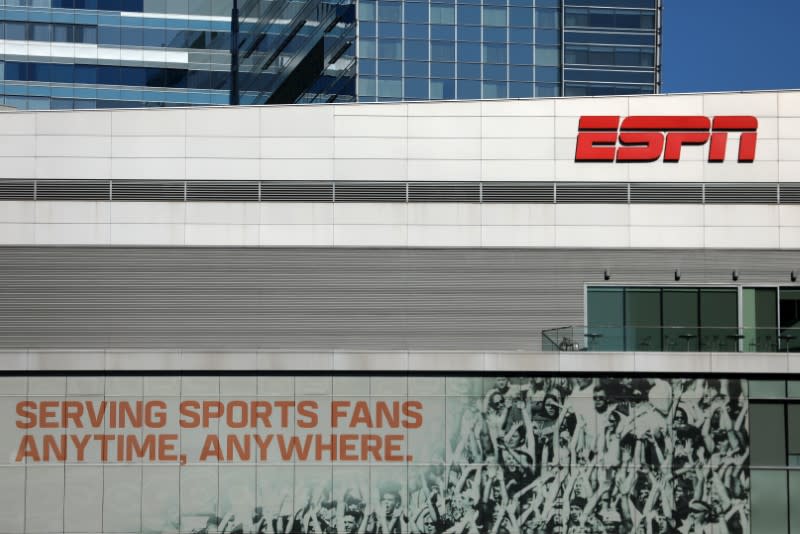Disney's ESPN problem comes down to simple math
In Disney’s Q2 earnings report on Tuesday, the company said that revenue for its cable networks division increased 3% but profit decreased 3%. It explained that this way: “The decrease in operating income was due to a decrease at ESPN… The decrease at ESPN was due to higher programming costs.”
The same exact sentence, almost verbatim, appeared in its earnings report for the past three quarters in a row. (See: Q2 2O17; Q1 2017; Q4 2016.)
It’s become the de facto narrative every time Disney reports earnings: ESPN gets framed as the dark cloud of “doubt” that “drags down” Disney. And indeed, ESPN has lost more than 10 million subscribers in four years. ESPN is still profitable for Disney—which too many hot-take stories overlook—but less profitable than it was in the past. (Last month, ESPN cut more than 100 employees, most of them on-air talent.)
And when Disney reports these dour numbers, pundits like to sound off on what exactly ESPN is doing wrong. Many vocal people on Twitter blame politics and accuse ESPN of going liberal. TV analysts point to the rise of cord-cutting that has plagued the industry at large.
But the largest problem ESPN faces is simple, stark math: it is paying more and more in rights fees to show games, while suffering more and more subscriber losses.
The scale is tipped on the wrong side. This situation is untenable.

ESPN will spend $8 billion in 2017 in programming fees.
It pays $1.9 billion per year to show 17 Monday Night Football games. It recently signed an eye-popping new deal with the NBA that took effect this season: $24 billion for 9 years, or $1.4 billion per year. It pays $700 million per year to show MLB games. It pays $600 million per year to show the College Football Playoff and other bowl games.
BTIG analyst Rich Greenfield has called these astronomical agreements ESPN’s “big mistake.”
But ESPN president John Skipper has insisted the NBA package (the deal most commonly criticized recently) was not a mistake. And on Disney’s Q2 2017 earnings call Tuesday, Disney CEO Bob Iger said that ESPN will continue to pay big for rights fees.
We will continue to be aggressive at buying live sports rights,” Iger said, “which have not gotten cheaper, we understand, but have gotten only more valuable.”
Iger isn’t wrong, in the sense that anything ESPN does not bid for, it risks losing to Fox, which has tried to make its FS1 network a direct ESPN challenger.
But something has to give. ESPN cannot continue paying higher and higher fees unless it also turns around its business. Judging by Iger’s comments, it will do that by focusing on one word: mobile.
“As we expand and enhance our mobile presence, we’re seeing tremendous advances in mobile viewing,” Iger said on the call. “Almost 80% of people who access ESPN each month access it on mobile devices… ESPN has taken a number of steps on their mobile business, particularly consolidation of their apps and improving user interface and use of video on the apps… The numbers have been tremendous. That’s going to continue to grow and they’ve got big plans to do that.”
The plans start with some kind of OTT (over the top) streaming service for ESPN, which will come later this year, Iger said. BAM Tech, the spun-off video arm of Major League Baseball that Disney invested $1 billion in last year, will build it.
But it will not yet be the all-access ESPN offering that cord-cutters crave, Iger stated: “We don’t have plans right now to take ESPN as it is currently distributed and go over the top with it… frankly, we don’t really feel we’ve got a great need to do that.”
Translation: ESPN’s forthcoming OTT product will not be akin to HBO Now, the standalone service HBO offers that gives access to all HBO programming, past and present. Rather, it will be additive, likely offering programming that isn’t shown on ESPN’s cable channel.
Will that be attractive enough to offset ESPN’s subscriber losses and rising programming fees?
—
Daniel Roberts is the sports business writer at Yahoo Finance. Follow him on Twitter at @readDanwrite.
Read more:
ESPN will look dramatically different in 1 year
ESPN will cut 100 on-air personalities today
Hulu skinny bundle is the latest sign of Disney yielding to cord-cutting
